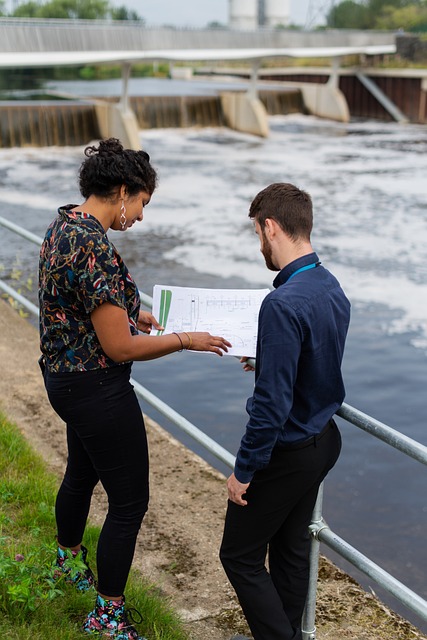Hybrid heat pumps, leveraging electrical energy and renewable heat, offer an efficient alternative to traditional boilers. Qualified boiler engineers ensure optimal performance and safety in commercial settings. These advanced systems reduce greenhouse gas emissions, lower utility bills, and have a smaller carbon footprint. Compared to traditional models, hybrids are more energy-efficient, especially with dual-fuel capability. Proper maintenance, including 24/7 services, enhances system longevity. Hybrid heat pump boilers pay for themselves within 5-7 years, providing maximum savings for homeowners and businesses alike.
In the pursuit of efficient heating solutions, hybrid heat pump boilers emerge as a compelling alternative to traditional models. This article, penned by a qualified boiler engineer, delves into the intricacies of these advanced systems. We’ll explore understanding hybrid heat pumps, compare them with traditional boilers, highlight their advantages, and analyze energy efficiency and environmental impacts. By the end, you’ll grasp why hybrid heat pump technology is gaining traction as a sustainable choice for your home.
- Understanding Hybrid Heat Pumps: A Qualified Boiler Engineer's Perspective
- Traditional Boilers: Key Features and Limitations
- Advantages of Hybrid Heat Pump Technology
- Energy Efficiency Comparison: Who Comes Out On Top?
- Environmental Impact: Sustainable Choice for Your Home
Understanding Hybrid Heat Pumps: A Qualified Boiler Engineer's Perspective

From a qualified boiler engineer’s perspective, hybrid heat pumps stand out as an innovative and efficient solution in heating systems. Unlike traditional models that primarily rely on burning fuels like gas or oil, hybrid heat pumps leverage both electrical energy and renewable heat from the environment to deliver warmth. This dual-source approach not only reduces greenhouse gas emissions but also offers significant cost savings for homeowners and businesses alike, making it a top choice for those looking to optimize their heating efficiency.
When considering commercial boiler maintenance or repairing traditional boilers, the advantages of hybrid heat pumps become even more apparent. With proper qualifications, boiler engineers can install these systems, ensuring they meet specific building requirements and maximize energy performance. The best boiler repair services often involve maintaining and enhancing these advanced technologies, allowing businesses to benefit from enhanced comfort, reduced utility bills, and a smaller carbon footprint—all while ensuring the safety and reliability of their heating systems through regular inspections and meticulous commercial boiler maintenance routines.
Traditional Boilers: Key Features and Limitations

Traditional Boilers: Key Features and Limitations
Traditional boilers, often referred to as conventional or non-condensing boilers, have been the standard for residential and commercial heating for decades. These systems operate by burning fuel (such as gas, oil, or electricity) to generate heat, which is then distributed throughout a building via radiators or hot water pipes. Key features include ease of installation and operation, with many models offering simple control mechanisms and straightforward maintenance routines. However, they present several limitations. Traditional boilers are generally less efficient compared to modern alternatives, leading to higher energy costs over time. Additionally, they produce more waste heat and can be less adaptable to varying heating demands, making them less effective in optimizing energy usage.
For complex industrial heating solutions or intricate steam boiler troubleshooting guides, the role of a qualified boiler engineer cannot be overstated. These professionals are trained by factories specializing in boiler manufacturing, ensuring they possess the expertise needed to install, maintain, and repair these systems accurately. Their knowledge is particularly valuable for navigating the intricacies of traditional boilers, where proper setup and maintenance are crucial for optimal performance and safety.
Advantages of Hybrid Heat Pump Technology

Hybrid heat pump technology offers several advantages over traditional boiler models, making it an increasingly popular choice for homeowners and businesses alike. One of the key benefits is its energy efficiency. Unlike conventional boilers that primarily rely on burning fuel to generate heat, hybrid systems combine electrical power with a heat pump, allowing for more efficient heating and hot water production. This means reduced energy consumption, lower running costs, and a smaller environmental footprint.
Additionally, these advanced systems provide better temperature control and consistency. Heat pumps can extract heat from the outdoor air or ground even when temperatures are low, ensuring a steady indoor comfort level throughout the year. Regular boiler safety checks become more straightforward with hybrid models as they often incorporate smart features that enable remote monitoring and control, making it easier for qualified boiler engineers to conduct maintenance and identify potential issues promptly. Moreover, proper water treatment for boilers is crucial in maintaining their performance and longevity, which hybrid systems can facilitate through integrated water management solutions.
Energy Efficiency Comparison: Who Comes Out On Top?

When comparing hybrid heat pump boilers to traditional models, energy efficiency stands out as a key differentiator. Hybrid systems excel in this regard due to their dual-fuel capability, allowing them to switch between electrical power and heating oil or gas. This adaptability ensures optimal energy use based on outdoor temperatures, leading to significant savings compared to conventional boilers. While traditional boilers often rely solely on fossil fuels, which can be less efficient during cooler months, hybrids offer a more dynamic approach.
A qualified boiler engineer might note that heat pump technology in hybrid systems extracts heat from the air or ground, even at low temperatures, and transfers it indoors. This process is significantly more energy-efficient than traditional boilers, which typically convert fuel into heat directly. Moreover, regular commercial boiler maintenance and a reliable 24/7 boiler emergency service can further enhance the efficiency and longevity of any system, including traditional models. However, in terms of overall thermal fluid systems performance and environmental impact, hybrid heat pump boilers come out on top for their ability to reduce energy consumption and potentially lower operating costs over time.
Environmental Impact: Sustainable Choice for Your Home

Hybrid heat pump boilers represent a significant step forward in sustainable heating technology compared to traditional models. They offer an environmentally friendly alternative that’s becoming increasingly popular among homeowners looking for long-term savings and reduced carbon footprints. These advanced systems utilize thermal fluid technology, absorbing heat from the air or ground outside your home and transferring it indoors to warm spaces and water. This process is far more energy-efficient than conventional gas boilers, significantly reducing greenhouse gas emissions.
Choosing a hybrid heat pump boiler over a traditional model can be a smart decision for both your wallet and the planet. While the initial installation costs might be higher than those of a standard gas boiler, qualified boiler engineers estimate that hybrid systems pay for themselves within 5-7 years through lower energy bills. Moreover, with an improved understanding of thermal fluid systems, emergency plumbers in Bromsgrove can now offer efficient maintenance and repair services to ensure these innovative boilers continue to provide optimal performance and maximum savings for years to come.
Hybrid heat pump boilers offer a compelling alternative to traditional models, as evidenced by insights from a qualified boiler engineer. With their advanced technology, these systems provide numerous advantages, including superior energy efficiency and reduced environmental impact. While traditional boilers have their place, the growing popularity of hybrid heat pumps reflects a promising step towards more sustainable heating solutions for homes. By considering the benefits outlined in this article, homeowners can make informed choices that contribute to both comfort and ecological preservation.
